Seguimiento de los programas de transferencias monetarias
Los firmantes del Gran Pacto se comprometieron a aumentar el uso de los PTM y a utilizar marcadores comunes para medir estos incrementos. Aunque el seguimiento del volumen de los PTM está comenzando a realizarse de manera más efectiva, todavía persisten los desafíos técnicos y políticos. Estos incluyen:
- Definir qué datos se desea recolectar y cómo recolectarlos;
- Garantizar el compromiso y el uso de las categorías de datos y sistemas;
- Abordar las deficiencias de los sistemas de notificación existentes que no han sido diseñados para incluir o desagregar, dinero en efectivo, cupones y otras modalidades;
- Llegar a un acuerdo común sobre las categorías estándar para la presentación de informes a fin de evitar datos incompletos e incoherentes.
Prioridades actuales
Desde 2017 a 2019, la CALP Network colideró el Subgrupo de trabajo de asistencia en efectivo del Gran Pacto sobre el seguimiento de los PTM junto a la Dirección General de Ayuda Humanitaria y Protección Civil de la Comisión Europea (DG ECHO, por sus siglas en inglés), con el principal objetivo de acordar los requisitos mínimos para el seguimiento de los PTM. Esto incluye la integración de los PTM en los sistemas y plataformas de información interinstitucional clave, a saber, el Servicio de Seguimiento Financiero (FTS, por sus siglas en inglés) y el módulo de proyectos HPC de la Oficina de Coordinación de Asuntos Humanitarios (OCHA, por sus siglas en inglés), el Estándar de Datos de la Iniciativa Internacional para la Transparencia de la Ayuda (IATI, por sus siglas en inglés), y los informes de 3W (quién hace qué, dónde). El subgrupo de trabajo sobre seguimiento de los PTM ha sido fusionado en el subgrupo de trabajo de eficiencia, eficacia y relación costo-beneficio, que la CALP Network seguirá coliderando.
Contenido destacado

Tracking Cash & Voucher Assistance Workshop – Part 2: Report
Presentation
Do you want to read the latest on discussions on how to best track cash and voucher assistance in global interagency reporting systems? The CALP Network and ECHO have just released Tracking Cash & Voucher Assistance Workshop – Part 2: Report. Key recommendations emerging from the workshop are summarized below. These will be used in the coming months as a basis to develop guidance for...

Measuring Cash Transfer Programming – Scoping study
Report
This scoping study explores technical and policy issues that are constraining progress towards better measurement and reporting of Cash Transfer Programming (CTP) and addresses these to identify ways forward. The study was developed with the following objectives: • Map and document how different implementing agencies and donors are measuring cash and voucher programming data at the...

Tracking Cash and Voucher Assistance: Agreements, recommendations and minimum requirements from the Grand Bargain cash workstream
Guidelines and Tools
This document comprises the key outputs of the work undertaken through the Tracking Cash and Voucher Assistance (CVA) Working Group from 2017 to 2019. The Tracking CVA Working Group was established as the
platform for engagement and decision-making for the sub-workstream on Tracking CVA, which is part of the Grand Bargain Cash Workstream. The Tracking CVA sub-workstream was co-led by the the...
Líder temática
Últimos recursos

Tracking Cash & Voucher Programming Workshop
Presentation
The Tracking Cash & Voucher Workshop, convened by the CALP Network and DG ECHO, was held on June 6th 2018. The main objectives of the workshop, as defined by the co-leads, were as follows: Provide a forum to identify best practices and understand mutual objectives regarding measuring Cash and Voucher...

Marco Global Para la Acción
Guía y herramientas
Este marco proporciona un resumen consolidado de los principales compromisos y recomendaciones hechas para mejorar los programas de transferencias monetarias† en la respuesta humanitaria durante 2015 y 2016. Agrega el contenido central de: la Gran Negociación (Grand Bargain), los 10 Principios de ECHO,...
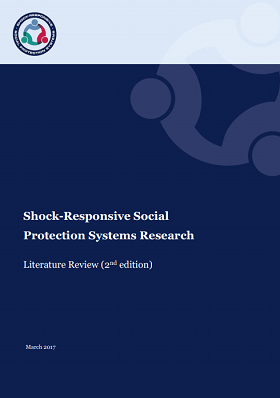
Shock-Responsive Social Protection Systems Research: Literature Review (2nd Edition)
Report
DFID has commissioned research into Shock-Responsive Social Protection systems, to further understand the nature of the interaction between social protection, humanitarian and disaster risk management systems and ways in which long-term social protection systems can be scaled up to provide support in...

A Review of Inter-Agency Collaboration for CTP Delivery
Report
Recent global initiatives have reaffirmed the potential for Cash-Transfer Programmes (CTP) to effectively and efficiently meet a wide range of disaster-affected populations’ needs while preserving dignity and choice. Although much work has been done in advocating for the benefits of CTP and enhancing...

Cash for Education: A global review of UNHCR programmes in refugee settings
Report
This review provides an overview of the use of cash assistance in 45 cash-related education programmes in 21 UNHCR operations. It highlights the key opportunities and challenges with the use of cash for education and provides key direction for future programming and related protection considerations....
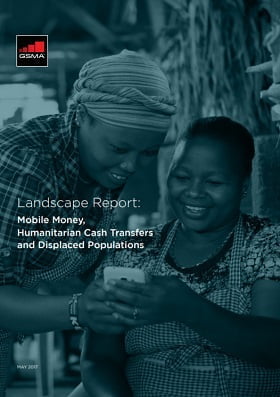
Landscape Report: Mobile Money, Humanitarian Cash Transfers and Displaced Populations
Report
Over the past decade, natural disasters and complex emergencies have led to a sharp increase in the need for humanitarian assistance. By the end of 2015, an estimated 65.3 million people were forcibly displaced globally, due to conflict and persecution. That same year, natural disasters caused the...

Looking Back to Move Forward: Building on Learning from 2011 to Strengthen the 2017 Drought Response in Somalia Learning Report
Report
This report provides a summary of the discussions that took place during a half-day reflection workshop in May 2017. More than 40 people from national and international NGOs, the UN, donors and research organisations came together to consider lessons from the 2011 drought response, reflect on the use of...

Cash Delivery Mechanism Assessment Tool
Guidelines and Tools
In line with its commitment to institutionalise the use of Cash-Based Interventions (CBIs), the office of the United Nations High Commissioner for Refugees (UNHCR) released the Operational Guidance for Cash-Based Interventions in Displacement Settings (“the Guidelines”) dated 4 February 2015, to...
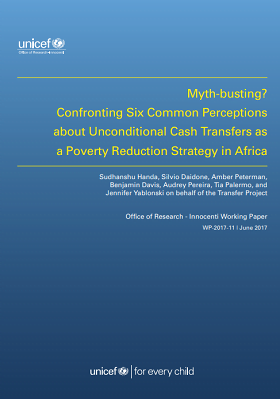
Myth-busting? Confronting Six Common Perceptions about Unconditional Cash Transfers as a Poverty Reduction Strategy in Africa
Report
This paper summarizes evidence on six perceptions associated with cash transfer programming, using eight rigorous evaluations conducted on large-scale government unconditional cash transfers in sub-Saharan Africa, under the Transfer Project. Specifically, it investigates if transfers: 1)...

Counting Cash: Tracking Humanitarian Expenditure on Cash-Based Programming
Report
This working paper aims to begin filling the data gap by providing a baseline estimate on the volume and nature of cash-based programming in 2015. Most of the largest implementing agencies of cash and voucher programming have provided us with data on their organisational expenditure relating to...

From Grand Bargain to Beneficiary: An Analysis of Funding Flows Through the Humanitarian System
Report
The study undertook a financial analysis of a range of projects that received ECHO funding in order to answer the following questions listed in full in the terms of reference (Annex 1): How much donor money (net) gets to the beneficiary? What are the total costs of each stage in the chain? What is...

Scaling up CTP in Somalia: A focus on: CTP options in a changing funding landscape and Improving the use of lesson learning
Report
This report summarises discussions that took place during a half-day event in November 2017. The event built on discussions in September during which a myriad of issues were highlighted and many opportunities for collective action noted. This meeting focused on a more in-depth discussion on two issues...

Guidance to Partners Funded by ECHO to Deliver Medium to Large-Scale Cash Transfers in the Framework of 2017 HIPs and ESOP
Guidelines and Tools
The use of multi-purpose cash transfers as a central component of humanitarian assistance is becoming increasingly important, in particular in the context of protracted crises in middle-income countries. Whilst an instrument such as the ESSN (Emergency Social Safety Net) in Turkey certainly represents an...

Tracking Expenditure on Cash Transfer Programming
Guidelines and Tools
The need for reliable and comparable data on Cash Transfer Programmes (CTPs), collected systematically and based on standardized markers and definitions, is widely recognised. Improved CTP tracking and reporting is essential for monitoring progress towards the commitments made to strengthen the scale and...
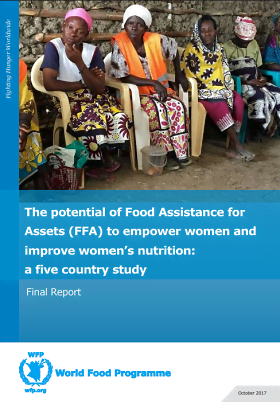
The Potential of Food Assistance for Assets (FFA) to Empower Women and Improve Women’s Nutrition: a five country study
Report
From June 2016 to April 2017, a five-country study to explore the potential of WFP’s Food Assistance for Assets (FFA) programmes to empower women and improve women’s nutrition was conducted by WFP. The purpose of the study was to: 1. Assess changes (outcomes or impacts) that relate to women’s...
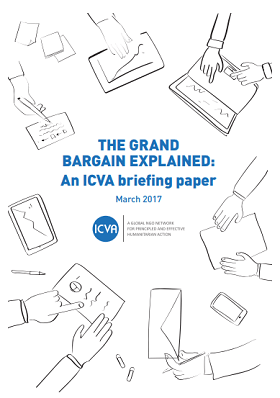
The Grand Bargain Explained: An ICVA Briefing Paper
Guidelines and Tools
ICVA, a global network of humanitarian NGOs dedicated to principled and effective humanitarian action, has created this Grand Bargain briefing paper to support NGOs (and all humanitarian actors) better understand and engage in the Grand Bargain. This briefing paper forms part of ICVA’s humanitarian...

Cash or in-kind? Why not both? Response Analysis Lessons from Multimodal Programming
Report
This research reviews lessons learned about response analysis from multimodal responses, that is, responses in which practitioners determined that more than one response modality between cash,vouchers, and in-kind, was a “best fit” or in which the conclusions about “best fit” changed over...

The Impact of Cash Transfers on Women and Girls
Report
This briefing summarises the findings on the impacts of cash transfers on women and girls. These are drawn from a rigorous review of the evidence looking at the impacts of cash transfers across six outcome areas (Bastagli et al., 2016). The review covered literature spanning 15 years (2000–2015). It...
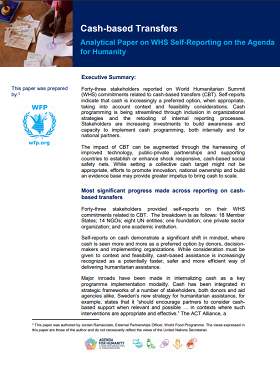
Cash-based transfers. Analytical Paper on WHS Self-Reporting on the Agenda for Humanity
Report
Forty-three stakeholders reported on World Humanitarian Summit (WHS) commitments related to cash-based transfers (CBT). Self-reports indicate that cash is increasingly a preferred option, when appropriate, taking into account context and feasibility considerations. Cash programming is being streamlined...
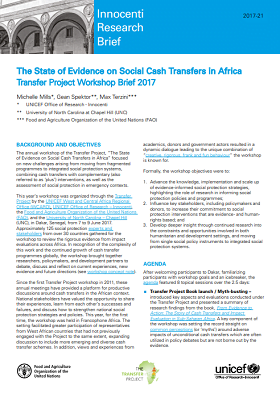
The State of Evidence on Social Cash Transfers in Africa. Transfer Project Workshop Brief 2017
Report
The annual workshop of the Transfer Project, “The State of Evidence on Social Cash Transfers in Africa” focused on new challenges arising from moving from fragmented programmes to integrated social protection systems, combining cash transfers with complementary (also referred to as ‘plus’)...



